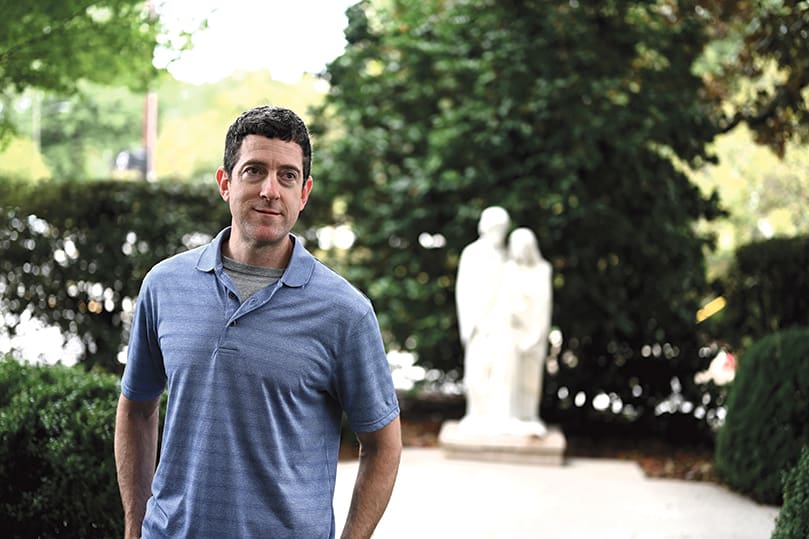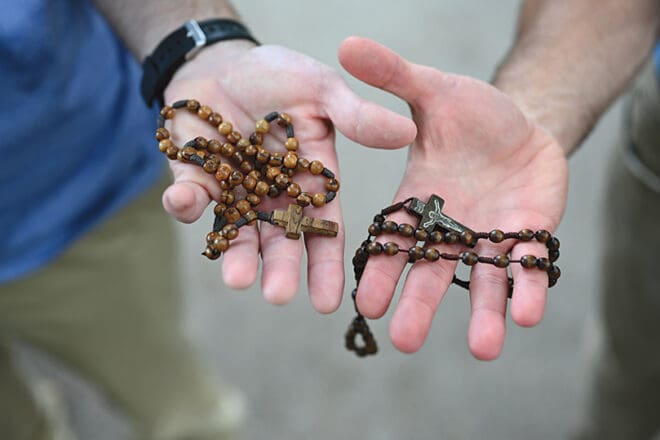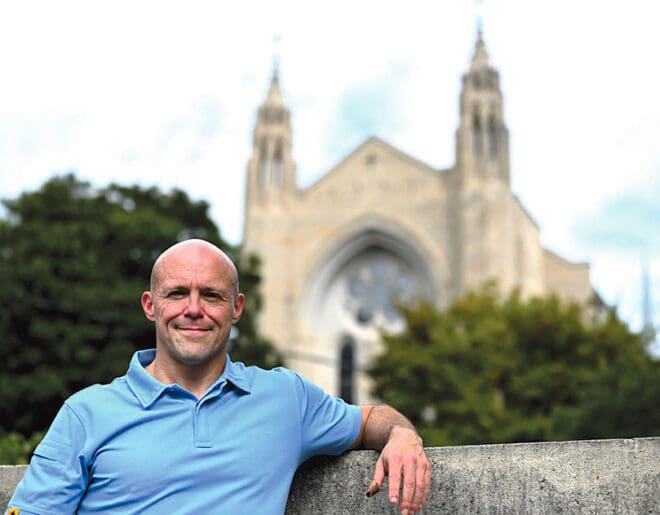 Photo by Andrew Nelson
Photo by Andrew NelsonAtlanta
Courage apostolate accompanies Catholics experiencing same-sex attraction
By ANDREW NELSON, Staff Writer | Published October 18, 2024
ATLANTA—With wooden rosary beads in hand, Sam Kerlin and Pete Cummings wandered in small groups on the paths of Mundelein Seminary, reciting the ancient prayer. The two Georgians joined hundreds of others there recently for a national conference focused on ministry to gay Catholics.
“There’s something about the rosary that just puts you at peace,” said Cummings as he sat outside of the Cathedral of Christ the King in Atlanta.
At the national conference, the two saw themselves in the hundreds of others striving to live as chaste gay men and women, reconciling their struggles with faith.
“We’re not the only ones suffering. We’re not the only ones struggling with chastity, and that it has value. That’s how I felt,” said Kerlin. “I left there being reminded the struggle is real, but it has value. It can be a source of joy and that was something I kind of forgot.”
Kerlin, a 49-year-old CPA, grew up in Birmingham, Alabama, raised by a single mother. Drawn to Catholicism from an early age, he struggled to knit his faith with his sexual orientation. He joined the church as an adult in 2003, feeling conflicted through his 30s, a time when he was dating men, and raising money to support same-sex marriage initiatives.
“There was this expiration date. I knew what I was doing was tenuous,” he said about dating men. “I was feeling a pang of conscience.”
Pete Cummings, 45, a retired Atlanta police officer, shared a similar experience. He came out to his Catholic family in his late teens and had a decade-long relationship with a man he loved. Even with this, Cummings said he knew, deep down, his life conflicted with his faith.
“I knew the entire time that I was in my relationships, I always knew that it was wrong. I felt that it was wrong in my heart,” he said.

Pete Cummings, left, and Sam Kerlin, rely on praying the rosary in their daily spiritual practices. Photo by Andrew Nelson
Both found their way to Courage, a ministry for men and women with same-sex attraction who are seeking to live chaste lives. The Courage meetings for them during the past seven years have become a place of fellowship, shared struggles and spiritual support from like-minded individuals.
“Ever since I found Courage and started living a chaste lifestyle, I feel peace,” Cummings said.
He said his parents introduced him to Courage when he was a teen, but he rejected it. At the time he was not mature enough to join. Today, he finds a community to stay rooted in his faith.
A lifeline for members
Courage International was founded in 1980. It emphasizes living chastely following the church’s teaching on homosexuality, while promoting a life centered on Christ with a spirit of fellowship. In 2016, it was granted a special status by the Vatican, making it the only canonically approved apostolate of its kind.
Its local meetings at the Cathedral of Christ the King follow a structured format, starting with reciting the five goals of Courage and personal check-ins where members share their struggles and successes. Its meetings are limited to people with same-sex attraction, as the church puts it. A sister organization, Encourage, offers spiritual support for families and friends.
Courage upholds the church’s teaching on homosexuality, which holds “homosexual persons are called to chastity” while calling for “respect, compassion, and sensitivity” toward people who are gay.
There are about 340 chapters in the U.S., with chapters in 17 countries. More than 200 attendees gathered recently at the University of St. Mary of the Lake and Mundelein Seminary for a national conference.
In the Archdiocese of Atlanta, monthly meetings are held at the Peachtree Road cathedral. The number of participants attending ranges from five to 15 members.
Father Mark White served as the apostolate’s chaplain before moving to his role as pastor at St. Joseph Church in Washington.
He wrote in an email that the members of the group are “often persecuted and/or ignored” for following the church’s guidance. “These people fully understand the sacrifice and cost of their decision to take up their cross and follow the Lord,” he wrote. The Courage members have “chosen by God’s grace to courageously strive for chastity.”
With the meetings, the ministry is a “a lifeline to its members,” where they are supported and encouraged by one another, wrote Father White. Its purpose “only desires to partner with the Holy Spirit,” he wrote.
Calling them “my brothers and sisters at Courage and Encourage,” the priest wrote the members have shaped his own faith and desire to follow Jesus. “I truly love and admire these people,” he shared.

Sam Kerlin joined the church as an adult and is a member of Courage in Atlanta. He also leads a new chapter that meets in Macon, in the Diocese of Savannah. As a gay man, he said he finds peace and a sense of well-being by striving to follow the church’s teaching on same-sex relationships. Photo by Andrew Nelson
The two Courage leaders believe the ministry can help more gay believers. Already, the men were instrumental in starting a chapter in Macon in the Diocese of Savannah in the spring. These meetings provide an outlet to discuss topics they often cannot talk about elsewhere. “There’s a healing that takes place,” Cummings said.
With its reputation as a gay-friendly Southeastern state, about 5 percent of the Georgia population is LGBT (Lesbian, Gay, Bisexual, Transgender), roughly 550,000 people, according to the UCLA Williams Institute.
Cummings and Kerlin fight a misconception that Courage is a form of conversion therapy. Both insist Courage does not attempt to change anyone’s sexual orientation, but instead aims to help individuals live in line with the church’s teachings on sexuality.
“We are not a conversion group. Not even close,” said Kerlin. “Not only do we not try to convert you, I think it’s impossible, personally.
“There’s nothing wrong with me. I’m not ashamed,” said Kerlin. “We have some really campy conversations, let me tell you. I mean, we laugh at all the silliest things, and we have fun. We don’t suppress that.”
They also countered a concern Courage is overly rigid with its emphasis on chastity. Cummings said while the teachings are strict, they are rooted in love and truth.
“The truth is hard, but if you really love someone, you tell them the truth,” he said. “It’s not easy. But we do have to pick up our cross, and we do have to move forward.”
The community lifts up its members through successes and shortcomings.
“You don’t go to Courage because you’ve got your act together,” said Kerlin. The reason for going is “because you need the physician, not because you’re healed.”
In choosing and staying on this path, both men recognized the need to make sacrifices. Cummings felt the sting of leaving his long-term partner and cutting ties with friends who continued to live in same-sex relationships.
“It was the hardest thing I’ve ever had to do,” he said. Cummings said sacrifices come along with spiritual growth. “You aren’t going to grow through easy moments.”
For Kerlin, the fear of loneliness is one of the biggest barriers to men joining Courage.
“When you leave the gay lifestyle, you lose a lot of friends because your goals are different,” he said.
The two are among found kindred spirits in the Courage community. Both consider the future with optimism. With the challenges, they are committed to their faith and accompanying others. Cummings, now a mentor to members of Courage, stressed the importance of perseverance.
“If you get up and you keep persevering, you will win every single time,” he said.
Kerlin said the ministry has guided him in faith and in finding peace.
“I may not be perfect, but I’m trying,” he said.